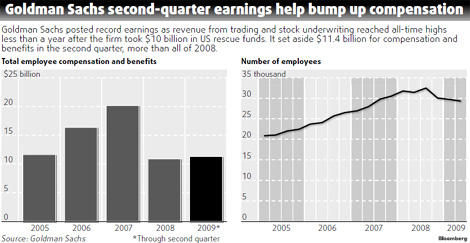
|
WORLD> America
 |
|
Is Goldman new king of the Street?
(China Daily)
Updated: 2009-07-16 10:22 NEW YORK: Goldman Sachs is emerging as the king of post-meltdown Wall Street. Already the most powerful US financial company before the credit crisis, the bank profited handsomely from Wall Street's rally and the recovering credit markets during the second quarter and distanced itself from the few competitors still standing. The result was a stunning profit of $2.7 billion - even as the bank repaid $10 billion in federal bailout money. The total blew past what Wall Street analysts were expecting. Goldman pulled off a remarkably speedy recovery from last year, when it lost $3.3 billion in four months during the worst of the financial crisis. And it had its best quarter since the end of 2007, when the recession was just beginning.
While other firms have curtailed risk and preserved cash to protect against further losses, Goldman has returned to what made it so profitable in the past - high-risk trading and investing in everything from mortgages to commodities and underwriting of stock and debt offers. "Goldman really is in a class by themselves," said Phillip Silitschanu, a senior analyst with Aite Group. "They've always been the golden child of the market." Of course, Goldman also benefited because there are fewer competitors on Wall Street following the demise of Bear Stearns Cos and Lehman Brothers Holdings Inc in 2008. Both companies were felled by their investments in risky, and ultimately failed, mortgage-backed securities. Changing mood And in a sign that the mood in Washington may be shifting, there was little outrage directed at Goldman from officials who have criticized the firm in recent months. Goldman took the bailout cash under pressure from the government at a time when faith in its financial institutions was shaken to its core. While Goldman is making money in its core businesses, it's also gotten some hard cash into its corporate treasury that has also strengthened the company. Warren Buffett made a well-publicized investment of $5 billion in the bank in September. Goldman also benefited from the government's bailout money to insurer American International Group Inc, which paid Goldman $12.9 billion during the first quarter. AIG was forced by contracts it had signed to compensate banks like Goldman for losses they suffered from complex mortgage investments. On Tuesday, President Barack Obama's press secretary was reluctant to discuss Goldman's results. "I'm generally hesitant - as I think the Treasury Department is - to comment on individual earnings reports," Robert Gibbs, the president's press secretary, said during a meeting with reporters aboard Air Force One. Goldman is the first bank to report second-quarter earnings. JP Morgan Chase, Citigroup and Bank of America will follow this week. By repaying the bailout money, Goldman freed itself of government-imposed restrictions on executive pay and bonuses that some of its rivals, including Citigroup and Bank of America, are still under. Goldman spent $6.6 billion in the quarter on pay and benefits, 41 percent more than in the first quarter. Year to date, the company has paid out $11.36 billion in compensation. Goldman's peers have been stung by bigger loan losses because of their focus on retail banking and because they dealt more in the risky mortgage-backed securities that drained hundreds of billions of dollars from other firms. Wall Street staged a huge rally in the second quarter, and Goldman took advantage of a recovery in the credit markets. With its own balance sheet intact, Goldman was ready to help other companies looking for an underwriter. "When times are bad, the thinking goes, go with the best of the best," Silitschanu said. Another reason business will probably keep coming Goldman's way: The demise of competitors like Bear Stearns and Lehman Brothers means investors simply have fewer places to take their money. Goldman earned $4.93 per share for the quarter after paying preferred dividends. Analysts polled by Thomson Reuters, on average, expected $3.54.
 AP |